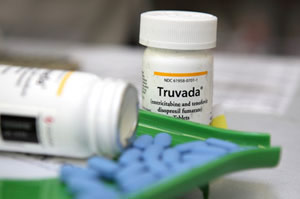Stigma Is A Side-Effect Of HIV-Prevention Medicine
By Jim Burress, WABE
Aug 11, 2014
In order to slow the spread of HIV, certain people who do not have the virus but are at risk should take medication to prevent becoming infected. That's the recommendation of the Centers for Disease Control and Prevention, and just recently, the World Health Organization.

Bottles of antiretroviral drug Truvada are displayed at Jack's Pharmacy in
November 2010 in San Anselmo, California.
(Photo Illustration by Justin Sullivan/Getty Images)
The preventive treatment includes a drug called Truvada, and it is known as PrEP, for pre-exposure prophylaxis.
Eric McCulley made the decision to start PrEP. He's 40, he's gay and he's HIV-negative. Outside an Atlanta coffee shop, he pulls out a plastic baggy with a few blue pills.
"They're a decent size, actually," he says. "Some people might call them a horse pill."
The treatment is a combination of two drugs that are also used to treat HIV.
 After hearing about the treatment and doing extensive research on his own, McCulley consulted with his primary care doctor. After hearing about the treatment and doing extensive research on his own, McCulley consulted with his primary care doctor.
"He was very supportive about it. He encouraged me to do it," he says. "He gave me a lot of stuff to read, gave me a lot of stuff to think about, and told me I was a good candidate for it. So off we went."
A few months into treatment, McCulley says the only change has been is in his attitude.
"I have what I was looking for. I have peace of mind. I feel like I've taken responsibility for my health," he says.
But some PrEP users worry that not everybody in the medical community is up to speed. Although Truvada has been on the market for a decade, only recently have prescribing guidelines been available.
Dylan West is a 25-year-old Atlanta resident and works in international aid. He is also gay and recently found out first-hand that not every doctor is as familiar with PrEP as McCulley's.
Some gastro-intestinal issues recently landed West in the emergency department. He'd started PrEP after beginning a relationship with someone who's HIV-positive. One of the doctors in the emergency room noticed West listed Truvada as a medication he regularly takes.
"She immediately, without asking any questions, just said 'Well, we should probably test for gonorrhea, syphilis, HIV/AIDS -- the list,' " he says.
West feels that physician made a "rash assumption" about his sexual practices because he was on Truvada. West knew stigma was something he might face.
"The assumption being, you're on Truvada, so you probably run around having sex with whoever you can," he explains.
Some health advocates and activists within the lesbian, gay, bisexual and transgender communities have gone as far as to label those on PrEP as "Truvada whores."
Dr. Melanie Thompson says she's heard that before. She's the principal investigator of the AIDS Consortium of Atlanta and has long worked in HIV research. She has encountered reluctance from some to prescribe PrEP because of lack of knowledge about it.
"This is an interesting thing to me," she says, "because doctors who say, 'I don't want to prescribe PrEP to somebody who might be at risk for HIV because they might not use condoms.' You know, it's an approach we wouldn't take in other areas of medicine. "
Thompson says no doctor would refuse to prescribe cholesterol-lowering statins to patients because they're overweight. Somehow, the conversation around PrEP is different.
"So I think it's a very interesting moralistic attitude that soon will be outdated. But I do think that this is a barrier for some patients," Thompson says. "They feel stigmatized. And honestly, health care providers need to step up their game and do better than that."
A CDC spokeswoman said that lack of awareness and knowledge among health care providers is one of the primary challenges to PrEP's success.
But both Dr. Thompson and CDC officials hope the newly issued treatment guidelines will help overcome any barriers.
Listen to this story
Click below to listen to the accompanying NPR story:
Preventing HIV With Medicine Can Carry A Stigma
###
Source: Kaiser Health News
http://www.kaiserhealthnews.org/Stories/2014/August/11/Stigma-Surrounds-Truvada-And-PReP.aspx#audio
For more HIV and AIDS News visit...
Positively Positive - Living with HIV/AIDS:
HIV/AIDS News
|